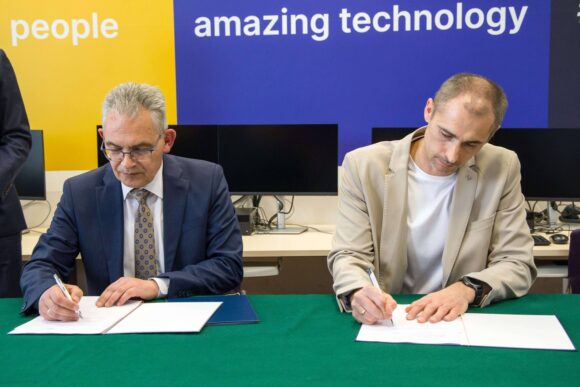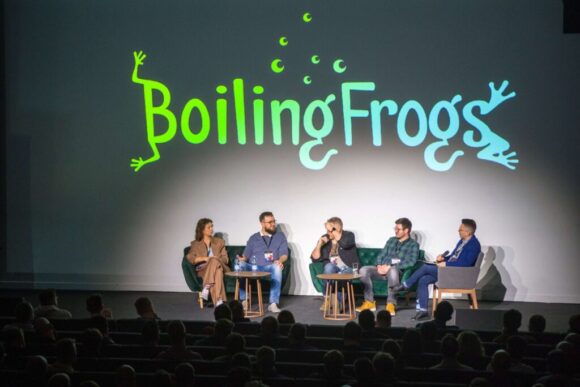
Our beginnings – part 3. Willingness is the most important – the story of Patrick

The third part of the series ‘Our Beginnings’ will take on a slightly different character. After getting to know the story of Leszek and Paweł, it’s time for Patryk – the author of our series, who not only reveals how he got into the IT industry but also tells how to join it. And most of all – how to join AUCTANE. The floor is his…
Icon with a predominance of blue, white editor background, no highlighting, and finally saving the file with the .html extension. This is how I would describe my beginnings as a programmer. A few months later, having some general knowledge of computer construction, in my junior high school I took part in a computer science competition. I took second place there, and the laureate followed me all the way through the technical school to college, reminding me who the #1 is.
My first steps towards what I might call programming were in Pascal. It was a clash with reality – programs are created by people, not wizards, and everything has to be written? If I remember correctly, I finished Pascal at a very basic level. These were variables, methods, and go-to instructions. I put Pascal down and looked for something new. This is how I found Java and started working with the famous JVM. Was it easy? Absolutely not. Understanding classes, references, polymorphism, variable types, and why exception handling is important was a challenge. My studies lasted a year. In addition, a few courses, two of my own projects, and then I decided that it was a good time to test myself. Does it take a year for everyone? Of course not. It may be shorter and it may be a little longer.
Also read: Our beginnings – part 1. You become a specialist in a team – Leszek’s story
But what was the most important…? Programming is about learning more than just hitting the keyboard to get ‘Hello World’. I learned 90% of programming from my own mistakes, unhandled exceptions, lack of validation, and logical errors. There were hundreds or even thousands of them. Therefore, not just watching the courses, but doing your own design is the biggest challenge. One thing I can promise you – it won’t work the first time. But is that wrong? When you get a programmer job, does everything work the first time? Here the answer is once again – no. Developer and QA tests quickly verify the reality and then the fixes begin. But that’s the point. For something to function stably, it takes time and a few pairs of eyes.
Okay, so what do I need to know?
The main thing is a lot of willingness. Seriously. It’s hard to watch a program written that doesn’t necessarily work as intended, so being stubborn is essential.
C# .NET and more
Technologies that are worth learning to become one of the AUCTANE people are definitely C# .NET. Used by several departments, including mine, i.e. courier. We pay special attention to clean code. If what you sent with your CV reads great, then you are on the right track. Regarding logic, we pay attention to every place where there can be a null, empty value, or any unhandled exception. Conditions should become a new ally in checking that all values that were to be provided are provided. It is also worth considering the efficiency of the written code. For a beginner, it may seem unnecessary, but try to use Gatling or even SoapUI and stress-test your program, then try to improve something to make it faster and better. Additional advantage? Gatling and knowledge of stress tests look good on CV 🙂
Also read: Our beginnings – part 2. Learning never ends in this profession – the story of Paweł
It is also worth taking an interest in regexes, the favorite polymorphism, and design patterns. Access modifiers, what are the data types and where they are stored in memory, and what is ‘static’. To some, this will sound like the basics (and rightly so), and to the rest, it should sound like a TODO list to learn.
Performance
Stress tests are important, but they are not the only type of tests. By joining AUCTANE there is a good chance that the code will be validated by Marcel. Here, without Unit Testing, you can’t do anything. It’s a good idea to include NUnit in your project and run your imagination, which could go wrong. You may find it useful to know the principles of ‘SOLID’ and the AAA naming convention (GWT). Also, think about what takes priority when the test fails – should the test or the code be changed?
Database
There is also a place where you can store data – databases. Although we have a separate team of great ‘databaseers’ for this, it will not do without a good foundation in this area. What do I mean?
- You can’t go without SELECT. It’s the basis of the basics.
- DML or influencing what is already in the database.
- A large amount of data in the database requires that you see the indexes.
- Finally, don’t forget about procedures.
How about Java?
Java must not be forgotten either. Also widely used in AUCTANE. It shares a lot with C# (and even vice versa), so going through the steps I mentioned above will definitely help. Knowledge of Spring and the use of databases in the code will be a big advantage.
ShipEngine
TypeScript has also appeared in the company recently. People involved in this field will be able to show initiative in creating new processes, approaching code development, checking, and testing.
Version control
And all of this is connected by version control. The best way to show your project is to send a link to the repository. But to make this possible, there are a few Git commands you should know, such as push, pull, commit and add.
A big step
Having all of this, you need to take the first big step and send us your CV. I will tell you what we have, what I liked, and what you can polish with us 🙂
